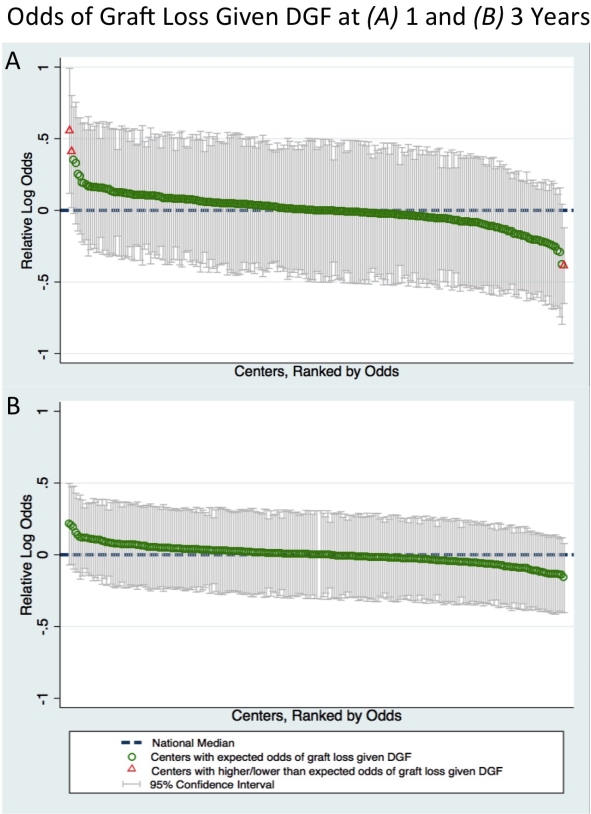Evaluating Delayed Graft Function After Kidney Transplantation as a Potential Surrogate Outcome.
Department of Surgery, Johns Hopkins, Baltimore, MD.
Meeting: 2016 American Transplant Congress
Abstract number: A223
Keywords: Graft survival, Kidney transplantation, Outcome
Session Information
Session Name: Poster Session A: Long Term Outcomes in Kidney Transplantation
Session Type: Poster Session
Date: Saturday, June 11, 2016
Session Time: 5:30pm-7:30pm
 Presentation Time: 5:30pm-7:30pm
Presentation Time: 5:30pm-7:30pm
Location: Halls C&D
Background: Recent work demonstrates significant inter-center heterogeneity in delayed graft function (DGF) rates after kidney transplantation, calling into question the value of a metric based on the subjective clinical decision to initiate dialysis in the week following transplant. However, DGF is a potential surrogate outcome for many important clinical trials, and its validity of such has not been robustly evaluated. If DGF were valid (i.e. associated with the outcome of interest), irrespective of heterogeneity of DGF rates, it would qualify as a surrogate endpoint.
Methods: Using SRTR data between 2000-2013, we developed a multilevel mixed effects logistic model to study variations in the center-level association between DGF and graft loss at 1 and 3 years following deceased donor kidney transplantation (DDKT), after adjusting for patient characteristics.
Results: Of 107,808 DDKT recipients, 23.5% developed DGF. One-year graft loss was 10.3% in patients with DGF compared to 3.1% without (P<0.001). Three-year graft loss was 19.9% in patients with DGF compared to 9.6% without (P<0.001). Adjusted odds of graft loss given DGF were 2.97 (95%CI 2.76-3.21) at one year and 2.05 (95% CI 1.94-2.17) at three years. At 1 year, 98.7% of centers had odds of 1-year graft loss given DGF consistent with the national median. At 3 years, all centers had odds of graft loss given DGF consistent with the national median. 
Conclusions: DGF is associated with significant odds of graft loss at 1 and 3 years following DDKT. This association remains impressively consistent at the center level, validating DGF as a robust, consistent construct. The absence of substantial center-level heterogeneity in this association provides support to the generalizability and utility of DGF, as presently defined, as a clinical and scientific tool, including a possible surrogate endpoint for future clinical trials.
CITATION INFORMATION: Cramm S, Luo X, Massie A, Segev D. Evaluating Delayed Graft Function After Kidney Transplantation as a Potential Surrogate Outcome. Am J Transplant. 2016;16 (suppl 3).
To cite this abstract in AMA style:
Cramm S, Luo X, Massie A, Segev D. Evaluating Delayed Graft Function After Kidney Transplantation as a Potential Surrogate Outcome. [abstract]. Am J Transplant. 2016; 16 (suppl 3). https://atcmeetingabstracts.com/abstract/evaluating-delayed-graft-function-after-kidney-transplantation-as-a-potential-surrogate-outcome/. Accessed January 13, 2026.« Back to 2016 American Transplant Congress
